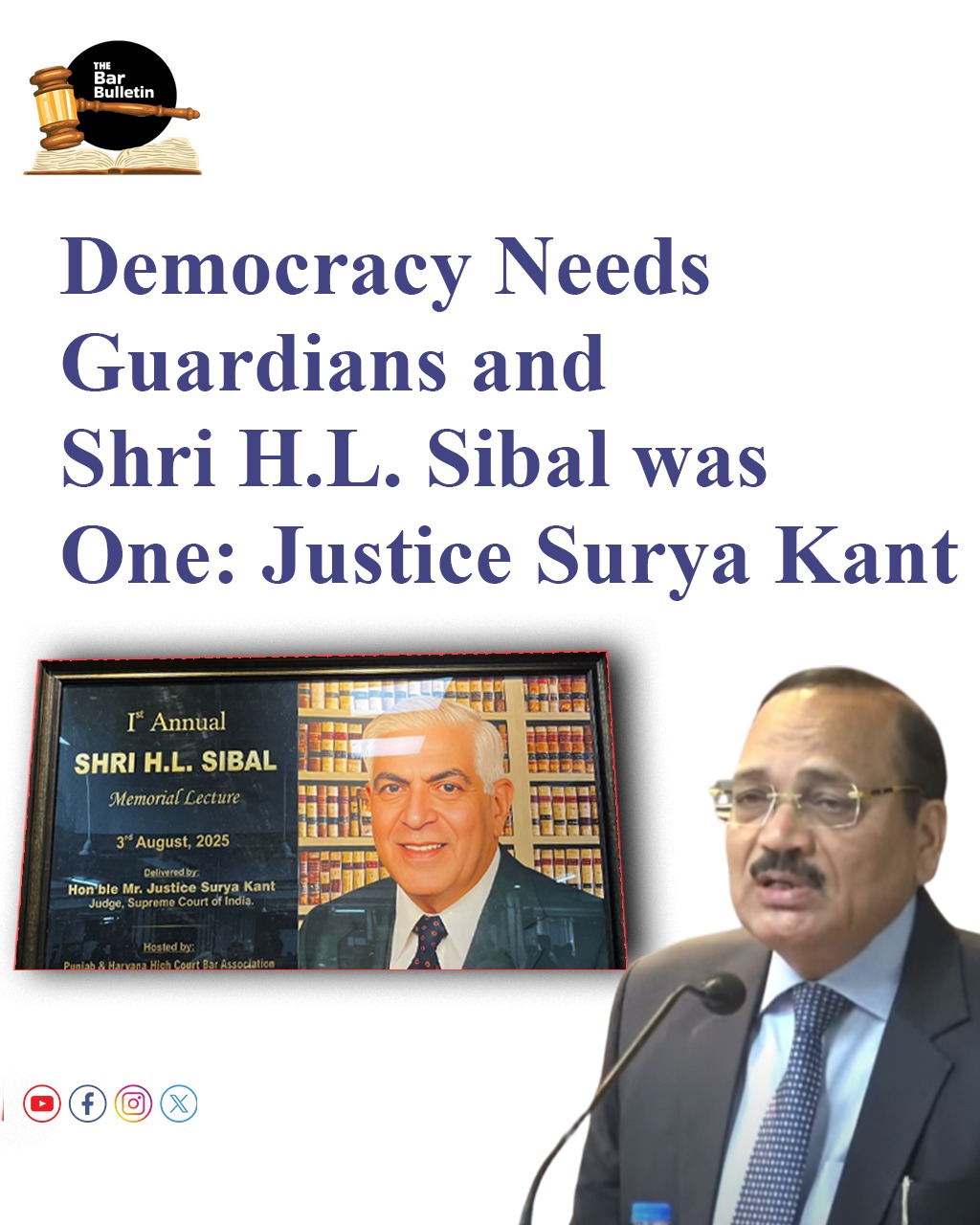The First Annual Shri H.L. Sibal Memorial Lecture was delivered by Hon’ble Mr. Justice Surya Kant, Judge of the Supreme Court of India, before a distinguished audience at the Punjab and Haryana High Court. The event was attended by leading members of the Bar, senior advocates, members of the judiciary, the Sibal family, and legal professionals from across jurisdictions.
Justice Surya Kant opened his address with a note of humility and deep respect, calling it a privilege to speak on the life and legacy of Shri H.L. Sibal, a towering figure in Indian legal history. Describing Shri H.L. Sibal as a brilliant orator, fearless advocate, and a symbol of civil liberties, Justice Surya Kant remarked that encapsulating the full magnitude of Shri H.L. Sibal’s contributions was nearly impossible.
He described Shri H.L. Sibal as a “Karmayogi of the law” whose early legal practice, beginning in 1938 near the Ravi River in Lahore, was rooted in courage and conviction. Justice Kant recounted one of Shri Sibal’s earliest cases, where he defended the right of the transgender community to conduct a traditional burial decades before constitutional rights or Article 21 protections existed. Justice Kant noted how Sibal’s argument that “decent burial is a human right” was accepted by a Lahore magistrate, setting the tone for a career defined by advocacy for the marginalized.
Justice Suryakant also recalled Shri H.L. Sibal’s harrowing journey during the Partition, and his eventual resettlement and rise in India. Starting a new in Shimla and then in Chandigarh, Shri H.L. Sibal built a six-decade-long legal career that saw him serve as Advocate General for both Punjab and Haryana. He remained apolitical throughout, firmly believing that a state lawyer’s duty is to the Constitution, not to any political party.
Justice SuryaKant offered a personal tribute, sharing how as a young lawyer he had been mentored by Shri H.L. Sibal. He narrated the turning point in his own early practice when Shri H.L. Sibal guided him through a constitutional writ petition concerning arbitrary removal from a market committee. Justice SuryaKant said that the experience of learning foundational constitutional principles including Article 14 and the doctrine of manifest arbitrariness under his guidance shaped his legal career.
Describing Shri H.L. Sibal as a refined man of culture and literature, Justice SuryaKant said that his charisma was matched only by his wisdom and personal grace. He noted Shri H.L. Sibal’s deep appreciation for classical Urdu poetry and his friendships with leading intellectuals and writers.
Turning to Shri H.L. Sibal’s professional contributions, Justice SuryaKant said Shri H.L. Sibal was not merely a successful advocate but an institution unto himself. His litigation spanned criminal law, constitutional law, service jurisprudence, and especially election law. Justice SuryaKant highlighted Shri H.L. Sibal’s principled defense in several landmark election cases, where he consistently argued against misusing the label of “corrupt practice” unless compelling evidence existed. This stance, Justice Kant said, was rooted in Sibal’s deep respect for the democratic will of the people.
He drew parallels between Shri H.L. Sibal’s work and the Supreme Court’s evolving electoral jurisprudence in cases like Common Cause, Raja Rampal, Brundavan Nayak, and others where the judiciary expanded the scope of judicial review to protect electoral integrity. Justice Kant emphasized that these contributions remain a living testament to Shri Sibal’s legacy.
He noted that Shri H.L. Sibal’s role in interpreting and applying constitutional provisions like Articles 32, 226, and 136, and in developing the anti-defection jurisprudence under the Tenth Schedule, helped fortify the constitutional vision of accountable governance.
Justice SuryaKant concluded his lecture by likening democracy to nuclear fusion, a force of immense potential that requires containment, balance, and principled restraint. In that framework, he said, the Constitution is the chamber, and the judiciary acts as the stabilizing force. He reaffirmed that legal stalwarts like Shri H.L. Sibal served as the moral and intellectual backbone of this system, and their legacy must inspire the next generation to uphold constitutional values with courage and integrity.
In Justice SuryaKant’s words, Shri H.L. Sibal did not merely practice law; he fortified India’s constitutional democracy through principled advocacy and moral clarity.

